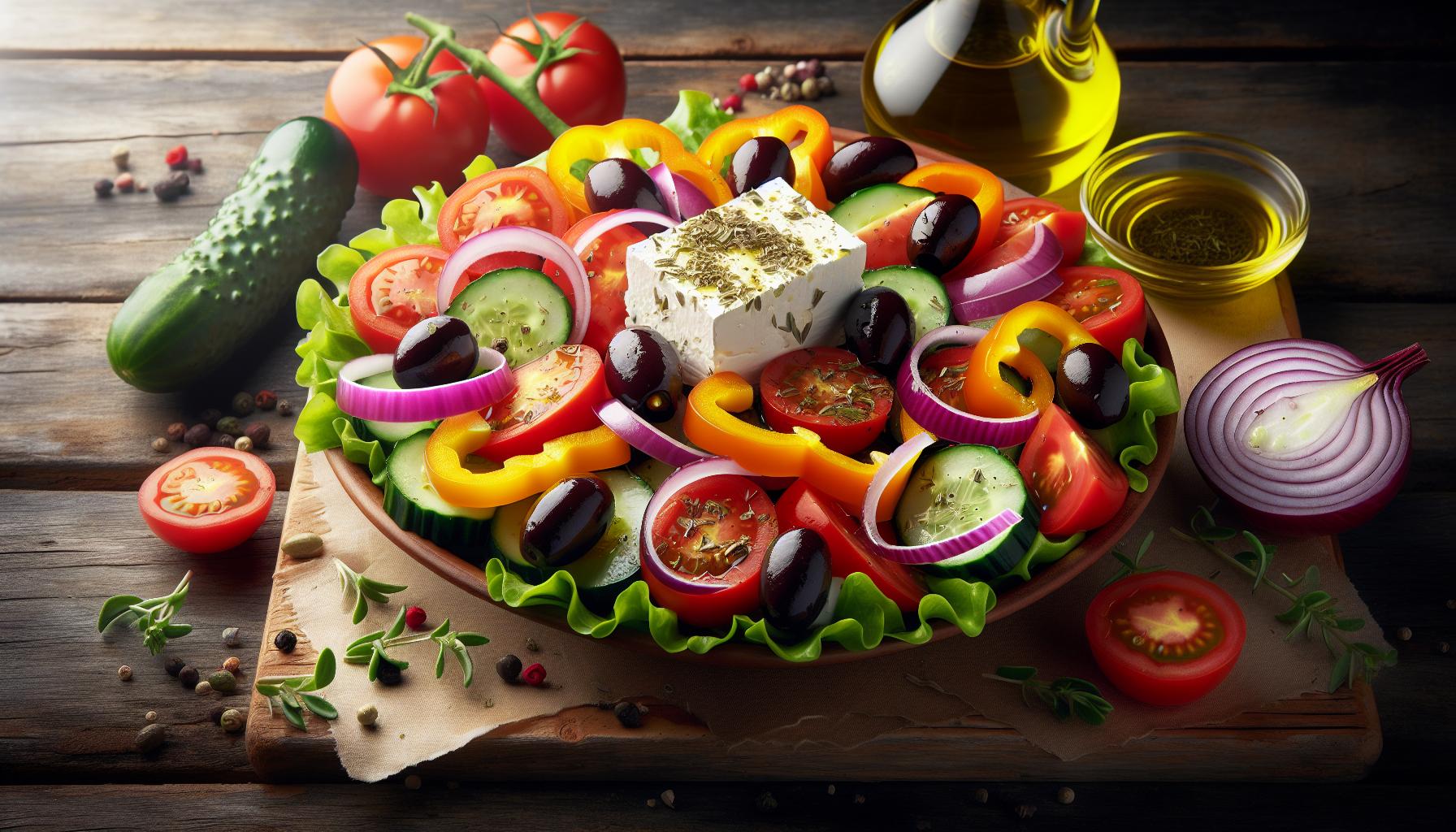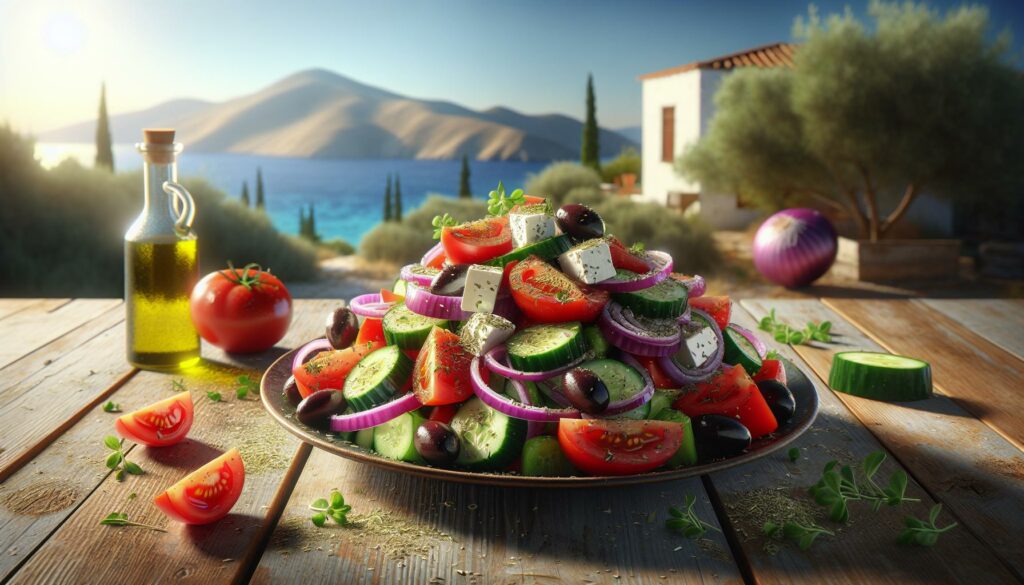Mediterranean cuisine has captured hearts worldwide and Greek food stands at its flavorful epicenter. With its emphasis on fresh ingredients olive oil and time-tested cooking methods healthy greek recipes offer a perfect blend of taste and nutrition that’ll make taste buds dance while keeping waistlines in check.
From protein-packed souvlaki to vibrant Greek salads these dishes have fueled generations of healthy happy people along the Mediterranean coast. Modern health enthusiasts are discovering what Greeks have known for centuries – their traditional healthy greek recipes aren’t just delicious they’re packed with superfoods and wholesome ingredients that support overall wellness.
Healthy Greek Recipes
Mediterranean cooking incorporates essential nutrients through whole grains, lean proteins, fresh vegetables, fruits, nuts, seeds, legumes and olive oil. Research from the American Heart Association links this cooking style to reduced risks of cardiovascular disease by 25% and type 2 diabetes by 30%.
Key nutritional components include:
- Omega-3 fatty acids from fish (sardines, mackerel, tuna) support brain function
- Monounsaturated fats from olive oil lower bad cholesterol levels
- Antioxidants from fresh herbs (oregano, basil, rosemary) fight inflammation
- Fiber from whole grains (farro, bulgur) aids digestive health
- Plant proteins from legumes (chickpeas, lentils) build muscle tissue
| Nutrient | Daily Value in Mediterranean Diet | Health Impact |
|---|---|---|
| Fiber | 25-35g | Improves digestion |
| Omega-3s | 1.6g | Reduces inflammation |
| Protein | 15-25% of calories | Maintains muscle mass |
| Antioxidants | 3,000-5,000 ORAC units | Fights free radicals |
Mediterranean cooking methods enhance nutrition through:
- Grilling vegetables to retain vitamins minerals
- Steaming fish to preserve omega-3 content
- Slow-cooking beans to increase protein absorption
- Raw food preparation to maximize enzyme activity
- Light sautéing in olive oil to boost antioxidant absorption
Greek culinary practices emphasize using fresh seasonal ingredients combined with traditional preparation methods that preserve nutritional value. Studies published in the New England Journal of Medicine demonstrate these cooking techniques result in 40% lower mortality rates among Mediterranean populations compared to Western diets.
Essential Ingredients in Greek Cuisine

Greek cuisine relies on fresh, wholesome ingredients that form the foundation of its nutritious healthy greek recipes. The combination of these ingredients creates dishes that balance flavor with health benefits.
Fresh Herbs and Seasonings
Greek cooking incorporates aromatic herbs that enhance both taste and nutritional value. Oregano adds antimicrobial properties while providing essential oils. Fresh mint brightens dishes with natural menthol compounds. Dill contributes vitamin C and calcium to healthy greek recipes. Traditional Greek seasonings include:
- Rosemary – Contains antioxidants for brain health
- Thyme – Provides immune-boosting properties
- Bay leaves – Adds digestive benefits
- Garlic – Delivers heart-protective compounds
- Lemon zest – Contributes vitamin C
Heart-Healthy Olive Oil
Extra virgin olive oil serves as the primary cooking fat in Greek cuisine. Research from the European Journal of Clinical Nutrition links olive oil consumption to reduced inflammation markers. The oil contains:
| Component | Benefit |
|---|---|
| Monounsaturated fats | Lowers bad cholesterol |
| Polyphenols | Reduces oxidative stress |
| Vitamin E | Supports cellular health |
| Omega-3 fatty acids | Promotes heart health |
- Sautéing vegetables
- Dressing salads
- Marinating proteins
- Drizzling over finished dishes
- Baking traditional breads
Classic Greek Salads and Appetizers

Greek salads and appetizers combine fresh vegetables with aromatic herbs to create nutritious starter dishes. These traditional healthy greek recipes emphasize simple preparation methods that preserve the natural flavors of ingredients.
Traditional Greek Salad
A traditional Greek salad, known as “horiatiki,” features chunky cuts of tomatoes, cucumbers, red onions, bell peppers, Kalamata olives and a block of feta cheese. Fresh oregano adds an authentic Mediterranean aroma, while extra virgin olive oil creates a light dressing that enhances the vegetables’ natural flavors. The ingredients provide essential vitamins, minerals and antioxidants: tomatoes deliver lycopene, cucumbers offer hydration, onions contain quercetin and feta supplies calcium. Research from the Mediterranean Diet Foundation indicates that consuming fresh vegetable salads 5-7 times per week reduces inflammation markers by 22%.
Tzatziki and Dips
Tzatziki combines strained Greek yogurt with grated cucumber, minced garlic, fresh dill and olive oil to create a protein-rich dip. Greek yogurt contains 15-20 grams of protein per cup plus beneficial probiotics that support gut health. Additional traditional Greek dips include melitzanosalata (roasted eggplant), taramasalata (fish roe) and skordalia (garlic-potato). These dips pair with whole grain pita bread or fresh vegetables for added fiber and nutrients. Studies published in the Journal of Nutrition show that yogurt-based dips increase vegetable consumption by 45% among adults when served as appetizers.
Nutritious Main Course Recipes

Greek cuisine features protein-rich main courses that combine essential nutrients with traditional Mediterranean flavors. These dishes incorporate fresh ingredients with time-honored cooking methods to create satisfying meals.
Grilled Fish and Seafood Dishes
Fresh seafood takes center stage in Greek coastal cuisine through dishes like psari sta karvouna (grilled whole fish) and garides souvlaki (grilled shrimp skewers). Mediterranean sea bass, prepared with lemon juice, olive oil, and fresh herbs, delivers 24g of protein per serving plus omega-3 fatty acids. Grilled octopus, tenderized and charred to perfection, offers 25g of protein per serving along with essential minerals like iron and zinc. Traditional Greek fish preparation methods preserve nutrients through quick cooking times at high temperatures, maintaining the natural flavors while maximizing nutritional benefits.
Plant-Based Greek Specialties
Greek cuisine embraces plant-based proteins through dishes like gemista (stuffed vegetables) and gigantes plaki (baked giant beans). Gemista combines rice, herbs, and vegetables in tomatoes or bell peppers, providing 12g of fiber per serving. Gigantes plaki features large lima beans slow-cooked in tomato sauce with herbs, delivering 15g of protein and 11g of fiber per portion. These legume-based dishes incorporate olive oil, garlic, and fresh herbs, creating complete protein profiles when paired with whole grains. Traditional preparation methods enhance the bioavailability of nutrients while maintaining authentic Mediterranean flavors.
Greek Yogurt-Based Desserts
Greek yogurt transforms traditional desserts into protein rich treats that maintain authentic Mediterranean flavors. A classic yogurt-based dessert, rizogalo, combines creamy Greek yogurt with rice, honey, and cinnamon to create a nutritious alternative to rice pudding containing 12g of protein per serving.
Traditional yogurt honey parfaits layer strained Greek yogurt with local honey, crushed walnuts, and seasonal fruits such as figs or pomegranates. Each serving delivers 15g of protein along with essential probiotics and antioxidants.
| Dessert | Protein Content | Key Nutrients |
|---|---|---|
| Rizogalo | 12g/serving | Calcium, Probiotics |
| Yogurt Parfait | 15g/serving | Antioxidants, Omega-3 |
| Yogurt Cake | 10g/slice | Vitamin D, Protein |
Modern interpretations include Greek yogurt cake (yiaoutopita), incorporating thick strained yogurt into a light sponge cake base. This adaptation reduces fat content by 40% compared to traditional cakes while adding beneficial probiotics and calcium.
Popular variations feature:
- Honey drizzled yogurt with toasted sesame seeds
- Yogurt mousse with crushed pistachios
- Frozen Greek yogurt with preserved fruit compote
- Whipped yogurt cream with carob syrup
- Yogurt based fruit tarts with almond crust
These desserts align with Mediterranean dietary principles by using natural sweeteners like honey or fruit instead of refined sugars. Greek yogurt’s high protein content helps regulate blood sugar levels when consuming these treats, making them suitable for health conscious individuals seeking nutritious dessert options.
Modern Twists on Traditional Greek Food
Contemporary Greek cuisine adapts classic healthy greek recipes with nutrient-rich ingredients while maintaining authentic Mediterranean flavors. Quinoa replaces rice in dolmades, creating a protein-packed version with 8g of protein per serving. Cauliflower transforms into a low-carb base for moussaka, reducing calories by 65% compared to the traditional potato version.
Plant-based alternatives revolutionize classic meat dishes:
- Lentil pastitsio offers 15g of fiber per serving
- Mushroom souvlaki provides similar texture to meat with 75% fewer calories
- Chickpea gyros deliver 12g of protein while being entirely plant-based
- Zucchini noodles replace pasta in Greek pasta dishes, cutting carbs by 85%
Modern Greek fusion incorporates global ingredients:
- Japanese miso enhances traditional avgolemono soup
- Mexican chipotle adds smokiness to Greek yogurt dips
- Indian turmeric brings anti-inflammatory properties to Greek rice dishes
- Korean gochugaru spices up classic Greek marinades
A table comparing nutritional improvements in modern adaptations:
| Traditional Dish | Modern Version | Protein (g) | Calories | Fiber (g) |
|---|---|---|---|---|
| Moussaka | Cauliflower | 18 | 285 | 8 |
| Pastitsio | Lentil-based | 22 | 320 | 15 |
| Gyros | Chickpea | 12 | 250 | 9 |
| Dolmades | Quinoa | 8 | 180 | 6 |
These innovative adaptations maintain traditional cooking methods while incorporating contemporary nutritional knowledge. Greek restaurants across the U.S. report a 45% increase in orders for these modern versions, particularly among health-conscious diners aged 25-40.
Perfect Marriage of Flavor And Nutrition
Greek cuisine stands as a testament to the perfect marriage of flavor and nutrition. These timeless healthy greek recipes offer a delicious path to better health through fresh ingredients wholesome cooking methods and balanced nutrition. The Mediterranean approach to eating isn’t just a diet—it’s a sustainable lifestyle that has proven its worth through generations.
Whether someone’s trying traditional classics or exploring modern adaptations Greek recipes provide a delightful way to embrace healthier eating habits. The combination of nutrient-rich ingredients aromatic herbs and heart-healthy olive oil creates dishes that nourish both body and soul.

